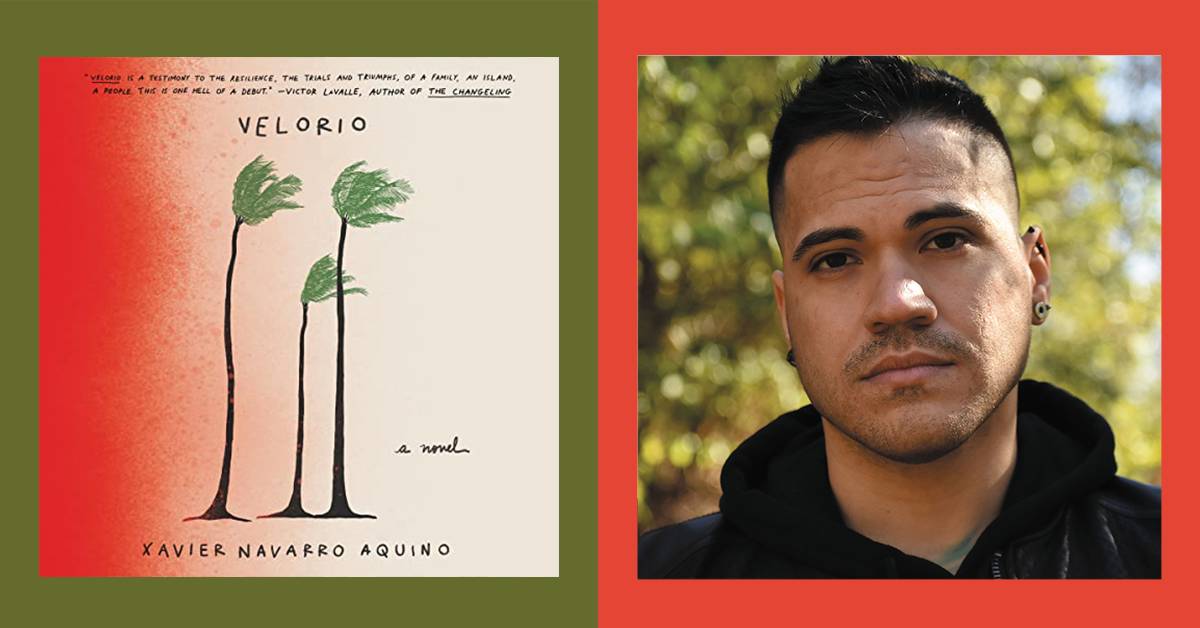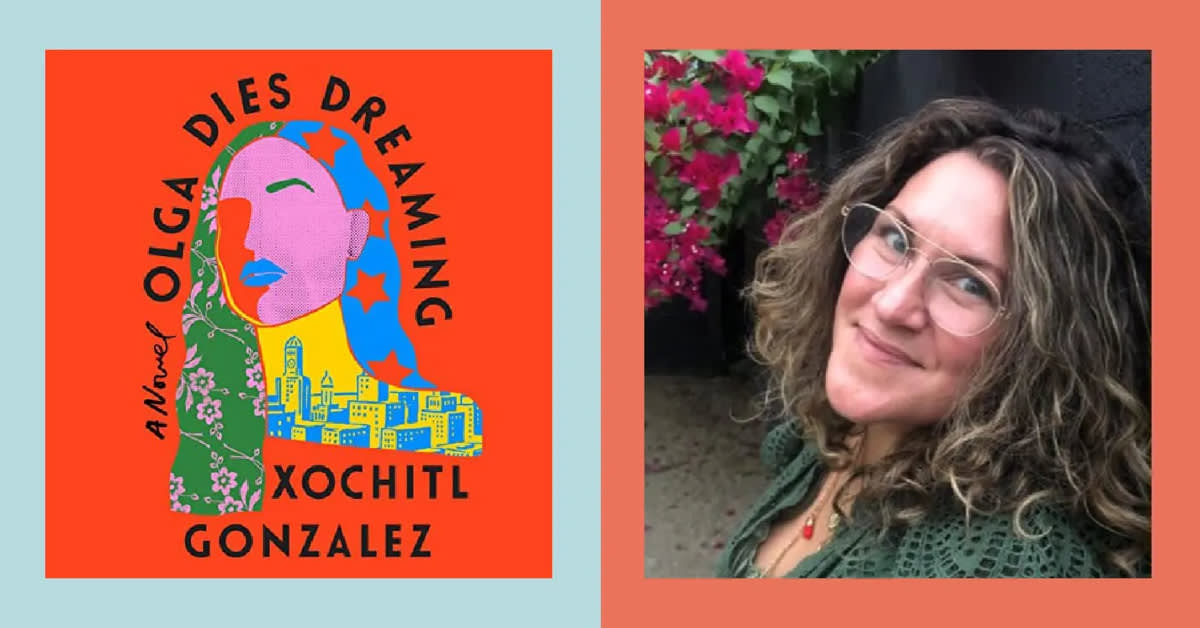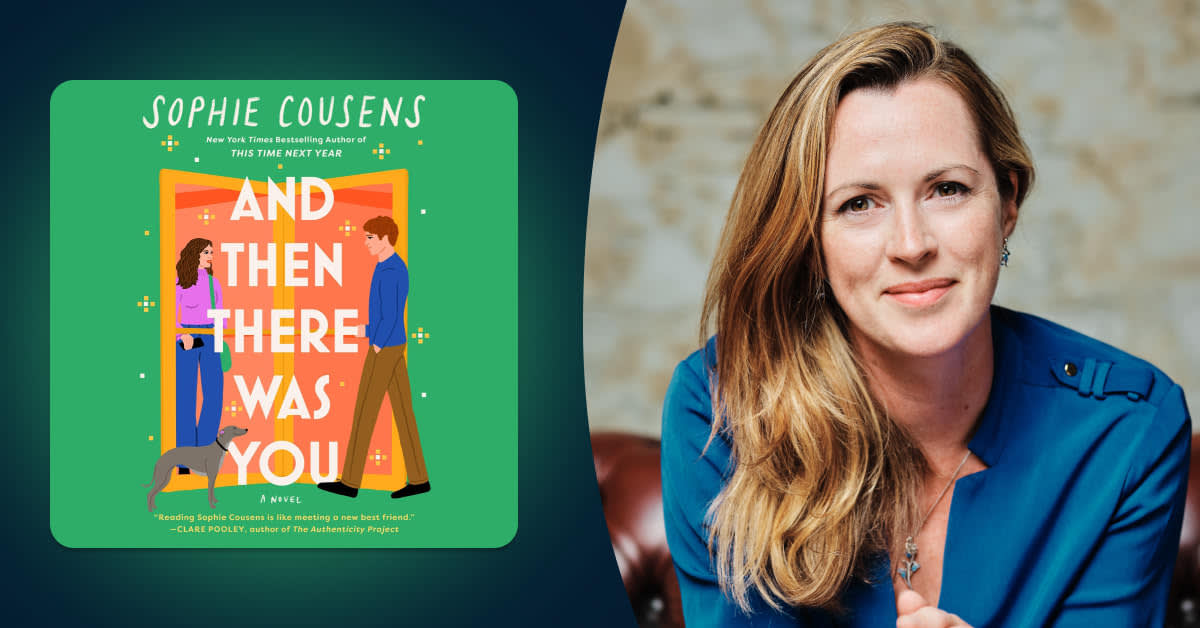Note: Text has been edited and does not match audio exactly.
Edwin De La Cruz: Hi, I'm Edwin, Audible editor, and today I have the pleasure to sit down for a chat with Xavier Navarro Aquino, author of Velorio, a powerful debut novel that follows survivors in the aftermath of Hurricane Maria, which left thousands dead and far more desperate for aid. Welcome, Xavier. How are you?
Xavier Navarro Aquino: Thank you. I'm doing well.
EDLC: Xavier, from the start, Velorio's a visceral work with heavy subject matter. What was it that lit the fire under you to write this story?
XNA: When I thought about the novel, I resisted the idea of writing about the hurricane. I think immediately after the hurricane, a lot of people were still in the process of grieving and the process of trying to come to terms with some of the implications of the natural disaster and what that meant and what it brought to light. So in many ways, I kind of kept the idea of writing about that hurricane on the back burner.
I was able to go back home immediately after the hurricane, and it was a very difficult journey, because as many Puerto Ricans would know, the connectivity to the island was all but obliterated. People did not have access to satellite signals to be able to contact their loved ones abroad that they were okay from the island. And so that left a lot of Puerto Ricans in the diaspora with a significant amount of anxiety and concern. I sort of fell into that group of people. My wife and I, we didn't hear from our family for a few days, and it started growing very concerning.
And so I foolishly took it upon myself to try to find a way back, and it was a difficult journey because flights were not being allowed to come in. There were maybe one or two commercial flights that were coming in to the airport. I didn't have a confirmation that I would have travel to be able to get home. I was set that I would want to walk, if for whatever reason the rental didn't come through.
So I went home. I was able to go home and see it and see the destruction. I think that was that first point of impact for me: to see everything that you grew up with completely destroyed overnight. And Puerto Rico's a very green, green space, and that was absent. And so to have been conditioned to that growing up and then see that gone in all its capacity was very impactful.
"I knew that I wanted to write a book that had multiple voices... it was going to be a story about a collective, and in many ways, that collective cry: anger, frustration, disappointment."
That was the start of it, but I didn't write about it until 2019. There was a story that I came across about two sisters, one of which was wanting to care for her older sister, very old. I think she was in her 70s, and so she could pass the hurricane with her because she was in an elderly home. She brought her to her house in hopes that that would be better for her, so she can ride out the storm with her. And a mudslide had inadvertently come in and had killed the oldest sister. That really marked something in me. I think that was the seed to thinking about Camila, the protagonist that opens the book.
EDLC: Why do you think it's important that this story be told?
XNA: There are a lot of things that the novel, I think, addresses and calls into question. As far as, like, the implications of colonialism and the consequences of neocolonialism in Puerto Rico as it stands today, as a commonwealth, as a territory, you know, its relationship to both the United States but also its previous colonizer, Spain, and also the Indigenous population. So all those things are inherent and are a part of what is being addressed in the book.
But outside of that, I think it's a very human story. It's a tradition that is known as a Caribbean Gothic, that it plays with magical realism, but that it accepts the elements of the grotesque as a standard, as an everyday consequence. And from there we can really untangle and try to address, through the characters, through their emotions, through their experiences, what it means to be sort of a contemporary subject to colonialism.
That's something that I was really set on when I finally set out to write the book. I knew that I wanted to write a book that had multiple voices; that it wasn't going to be a story about one person, but it was going to be a story about a collective, and in many ways, that collective cry: anger, frustration, disappointment. It's a spectrum, but mostly it came from that feeling of anger and frustration.
EDLC: You mentioned Camila briefly, and how that came about, but were other stories or characters based on true accounts?
XNA: I think that there's a lot of it that's true in the book. I think there's a lot of it that did occur in the book, whether it was the increase of suicides that happened immediately after the hurricane, and the mental health crisis that was happening back home was very evident. And so that made its way into the book in many different capacities.
The fear of not having a society run correctly or efficiently because of simple resources not being allowed to function, whether it's commerce, that everything became a cash society, was very evident, and so that lent itself to this despair. I mean, when I returned to Puerto Rico, I came with cash, as much cash as I could.
And so systems of governance completely collapsed in such a way that dystopia became the only real way for me to process all these events that occurred. I would say that, whether it's the inherent violence that isn't found in the novel, and all these accounts that occur that are fictional to some degree or to some capacity the sentiment is very much at its core, true.
What I hope that the novel carries, is that it is a true account—not a factual account—
but a true account of how people felt in one side of things, one spectrum. Because there is a whole other aspect of it which is very true, which is that humor is often used as a way to combat all these pains and all these traumas, and that is very much at the core of what it means to be Puerto Rican. Many minority populations process all these histories through elements of humor, but I didn't want the book to be anchored in that. I think there are moments throughout the book that carry that. There are humorous exchanges with a couple of the protagonists especially, but it didn't carry that sentiment for me and I was very set on it being this difficult and hard book to write, but I imagine also to read.
EDLC: I completely agree with you with the language and the banter, because we'll talk about that later, as well, but it felt very natural to me. You know, me being from Dominican Republic, I felt like I was there in those conversations, because that's how we speak. So, I see where you're coming from there.
Velorio is told from the prospective of various characters. How did you approach creating these characters?
XNA: Oh, it was very challenging, but I knew that if it wasn't going to be a challenge, then maybe it wasn't worth writing. I had set out with Camila already, and her sister, as sort of the core of this book, so I knew that she would be the center of the book. I knew that it would be a difficult dance, right? Because everyone sort of has their time on the mic. It's kind of like this momentary thing where people are coming in and then out, and so, like, they're passing the mic along in this very collective way.
That was something that intrigued me the most. I used the construct of As I Lay Dying, William Faulkner, and I had other books. I'm the type of writer that keeps books of influence for that project around me, because I do turn to them for inspiration and for ideas. I really enjoyed that play that Faulkner does with these voices. I wanted to carry that spirit.
And then from there, the other two close friends, Bayfish and Banto, they sort of came about in their own way, and Morivivi is a very interesting character; she was so important. She's influenced by just matriarchy and the influence of the women in my life, just strong-willed activists and sort of like a no-nonsense character. She was just very organic in that way, and came to life for me like that.
I think the trickiest protagonist was Urayoán, the antagonist, if you will, of the novel, and we could really go into depth with him as an antagonist. But he was very challenging, because I wanted, even if it's just theoretically or conceptually, to think about him as a Caliban figure, from Shakespeare's The Tempest. Caliban as a character is very prominent in Caribbean studies as a figure of complication, and that's what Urayoán represented for me when writing it.
But he's a very unlikable character. I mean, he just really is, and a lot of people have hated him, and that's good. I hope so. I hope that people really dislike him but that they don't misread him. There's a difference there, and I hope that that's something readers will slow down to actually look at him at the sentence level, that he does carry a lot of charged conversations internally that come to light through the discourse that he presents in his diatribes and his rants or whatever.
But yes, very unlikable. Part of that complication of creating all these characters was how to balance that—how to present him and then move him out of the spotlight, and then bring the others in as well. That was a fun and challenging adventure to do, a lot of trial and error, but essentially, I think I was very happy with how it manifested and it came to be.
EDLC: Well, I think it turned out fantastic. We're going to talk more about Urayoán in a minute, but speaking of Camila, Camila's story evoked a sentiment of magical realism, as you've stated already. Was that your aim? I know that in that recent interview you did with NPR you said this portion of Velorio haunted you, and to be honest, it still haunts me too. I think about all the time.
XNA: Yes. It was my aim, but I don't think it was, like, intentional in that way. I am not going to necessarily put myself in the same sentence as Toni Morrison, but she is a major inspiration to me, and so if you listen to how Morrison discusses and talks about how Beloved came to be for her, and the account, I think that was a similar experience, where I've really much felt Camila as something almost spiritual take over me.
"What I hope that the novel carries, is that it is a true account—not a factual account—
but a true account of how people felt."
And in that spirituality, you sort of see how she processes her reality, which is distorted, but it's distorted through an immediate impact of trauma, one in which by the very possibility she perhaps could have saved her sister. I think as a growing adolescent, as Camila is, she can't come to terms with that, and she's really resisting the fact that she's no longer there. And so throughout her narrative, and every time she comes to the center, I believe that she carries that spirit with her, carries Marisol with her, even though, at some point we see where that unravels throughout the narrative.
But, yes, she was difficult, she did haunt me, but I think in the best way. It wasn't this thing where I was afraid of her, it was just an insistence. I think Camila was an insistence. She was insistent on me as the vessel to write the narrative, and that's one of the reasons why I had mentioned that it brought me to tears multiple times throughout writing this book, but at the very end, specifically, when I was done, was that I just, I had hope that I did well by Camila's story. In many ways it falls into that spirit of magical realism; it falls into that spirit of a haunting.
EDLC: I absolutely agree. And I think there's an extra layer to Camila, and you hinted at it just now, her innocence of being a child. She's looking at it through a child's eyes and not as an adult, and you can see that in the dialogue she has with her mother and her, you know, her, "Ay, Ma," and these things that she goes through. Really, really amazing character. I'm sure that listeners will fall in love with her.
Now let's talk a little bit about Urayoán. Each character responds to the disaster in different ways, but Urayoán's story was a revelation to me. Without giving much away, what was the inspiration behind the motivations of this character? I listened to Urayoán in Spanish, and I found his performance to be almost maniacal, evil. Can you tell us more about that?
XNA: Yes, yes. When I was speaking with a producer at HarperCollins, and we were going through samples of readers, I love who we landed on, because I think how he performed it initially, in the sample that I heard, was just fantastical. The possibility of being sort of maniacal or unhinged in many ways, that was something that I wanted to carry, because I think he may represent—and I always preface everything with "may," because I think readers can read him in whatever way they feel—but for me, he represented generations and possibly centuries of frustration. He acts out that frustration in the worst possible way, right? The worst possible way being through acts of desperate violence.
But he isn't… I don't read him as a pure antagonist. There is a beautiful moment where he performs a really terrible act later on in the book and he regrets it. It's not an overt regret, but it's one in which he dedicates time in his rant, in his internal monologue, and that shimmer of remorse, I believe, allows for us to think about him with possibilities. Not to redeem him, because I don't think I was interested in having him be in any way a redeemable character. I don't believe that's a fair assessment of what currently occurs with neocolonial states, right? It's that there is no absolute redemption because it's such a complicated history. Perhaps he is not redeemable, these violent actions, they are unforgivable, but they carry a historical pain and historical legacy as well.
Yeah, he's difficult. I guess that's the best way to… Like, he's difficult, but he's supposed to be difficult. That's the hope, is that he's supposed to be difficult, you know?
EDLC: And as such, I think, you know, that manifestation of the colonial, postcolonial sentiment is still relevant today, and very much alive.
Let's keep talking about the audio. One great thing about Velorio that I found is that the audio is being released in both English and Spanish on the same day, and voiced by the same narrators. That rarely happens. Can you tell us what the recording process was like?
XNA: I was adamant that—and I wasn't sure about whether—I could make these requests as a debut writer. But when suggestions were being thrown at me, I had hoped and I had suggested, it's like, "We should really try to find a cast of characters that could do both," and it was sort of unanimous agreeance. So I think that process took a little bit more time to set everyone in place and make sure that everything would flow as correctly, as fluently as possible, but to me, that was essential.
It was essential because it is a part of what we are as Puerto Ricans, is that we do carry those languages. Some with greater capacity than others, but it is still an everyday occurrence back home of having both English and Spanish as this back and forth. It was a delight to see that come to fruition, to see that we were able to satisfy that requirement of having these narrators tell both stories in both languages. And I just I fell in love with the Spanish version. No offense to the English version, of course, because I do think that it's a beautiful rendition, but just like the translation process, it was a phenomenal thing to see it all come together, both audibly and also on the page with its translation of the book.
EDLC: I completely agree. And for me, Morivivi's narrator was on point because it evoked that strength that you talked about earlier. It came across so vividly, I thought, and it just brought these characters to life. Did casting the same narrators on both versions pose any challenges?
XNA: I would say so. I think our producer at HarperCollins, one of the things that he had said to me, he's also Puerto Rican Paved, he said "We're gonna keep trying," because at the first try, we were having difficulty finding the voices that can do both, but we just kept at it. And one of the things that Morivivi, for example, was so important to me, was that she would carry also an anger, but I think it's unlike Urayoán, she carries productive anger. She carries productive anger towards everything that is occurring.
EDLC: How did you approach writing Velorio in both English and Spanish?
XNA: The Spanish version, I was very lucky to have an exceptional translator. I worked with an exceptional translator and editor. I don't have the sort of the capacity in Spanish the way I do in English. My history with language is pretty simple. I was born and raised in Puerto Rico, but I went to an English-speaking school in Buchanan, or Buchanan because my mother's a teacher. I was fortunate or unfortunate, depending on what side you look at it, to have been instructed through English schooling.
"We need to be careful not to pass along colonial wounds because it is a very fragile thing, and very difficult to let go."
But I did lose a lot of my Spanish, and so that was the reason why I thought, "Well, I could translate it, but I'd do a terrible job at it." And so we got this wonderful professor at the University of Puerto Rico, Aurora Ugarte, and she was very happy to work with us as the translator, and she did a beyond exceptional job.
She and my Spanish editor, Ariana, did a wonderful job with walking through that process of editing and coming back and showing me what they were working on, how they were working on it, and that they wanted to include the Spanish of our island, of our people, and it was a very important task for us to try to walk through and have and collaborate with, but they did the heavy lifting. I'm not going to take credit for that at all. The Spanish version is done beautifully because of those two important figures in the process.
EDLC: I will say that I listened mostly to the Spanish version, but I did go and listen to several of Camila's chapters in English, and also Morivivi, and I felt that it was a seamless translation between the two, and like you mentioned earlier on how Puerto Ricans approach language, they speak in the English version as you might hear a Puerto Rican here in New York speak. And vice versa you go to the island, and you'll hear a Puerto Rican speak Spanish the way they would speak. So I think it was masterfully done in that sense.
Going back a moment, talking about the government, the feeling of anger and resentment and hostility everywhere against the government in Velorio, what do you hope listeners take away from it?
XNA: I hope that listeners will begin to hear and listen to possibilities of what may need to occur on the island, which is that I think we need a radical reassessment of where we're at as a commonwealth status, but abroad of what that means, and there is no clear answer. I think that one of the things that is present with Morivivi, when she first declares herself as a character at the very beginning of the book, is she's very happy to see that none of the prominent political parties work.
She represents sort of a new wave and a hopeful, optimistic wave of youth that are concerned about the three-party structure back home that mimics some of the United States' three-party structure, but it's sort of the independents, commonwealth, and statehood party system. Those have been the three dominant structures up until our last election, where there was a wave of youth that were just exhausted and angry with that system. It created a potential crisis for those governing structures, specifically the statehood party and the commonwealth party.
But mind you, I think that the novel also tries to reevaluate and suggest that we need to be careful not to pass along colonial wounds because it is a very fragile thing, and very difficult to let go. Generational violence is very much at the center of what the novel tries to address, and I think the possibilities are endless, but that we have to be creative and very purposeful in how we think about it, and how we think about reimagining a future that is better, because it needs to happen. And it will happen, and my hope with all things is that it is something that is a beautiful ending, as opposed to something terrifying.
EDLC: So well said. And I know that one character says, if I remember correctly, in Spanish he says something like, "I was born, I will live, and I will die on this island." It shows their love for where they live, you know? And hopefully that will happen.
XNA: Yes. I think so too. Yes.
EDLC: Well, Xavier, that's all the time we have. Congratulations on this impressive debut work, and thank you so much for spending time with us today.
XNA: Thank you, Edwin. That was wonderful. This has been great.
EDLC: For everyone listening, Velorio is available in Audible in both English and Spanish. Thank you so much.






